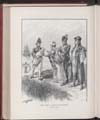
stnic.189007.001.001.jpg [illustration - The Baby a Prisoner-of-War. (See page 730.)]
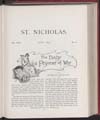
stnic.189007.001.002.jpg
The Baby a Prisoner of War
UST above the wide mouth of the Potomac, where, by a curve of the Virginia shore, a natural harbor is formed, stood a modest frame house, with close-cut lawn sloping to the water's edge, and a stately, old-fashioned garden in the rear, divided from the forest by a flourishing hedge of box.
One afternoon, in the year 1813, the blue waters of the tiny bay danced in the
May sunshine; the robins twittered in the lilac-bushes; the yellow, downy
chickens distracted their mothers by frequent incursions into the box-bordered
garden and rapid retreat before the energetic "shooing" of the bow-legged little
darky, posted in a shady angle of the wall to guard Mistress Prue Hungerford's
tulips and hyacinths. Without, were peace and plenty; within, homelike serenity
and contentment, as Mistress Prue sat in her straight-backed chair in the
pleasant, many-windowed sitting-room, busily sewing, and occasionally touching
with her silver-buckled shoe the cradle wherein peacefully slumbered a
flaxen-haired baby about three months old. Now and then a happy little smile
would break over the young mother's face, and seemed to be reflected in the
dimples that chased each other across the sleeping baby's soft pink cheeks. In
truth, Mistress Prue had every reason to be
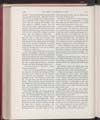
stnic.189007.001.003.jpg
thankful. Two years of happiness had just passed over her shapely little head.
Married to the man of her choice, an upright, brave Virginian gentleman,
everything in life seemed to favor them. Their child was thriving and beautiful;
their farm yielded a sufficient income; their few slaves were devoted to their
young master and mistress; and indeed until the War of 1812 with England, which
had begun some months before, there had been absolutely nothing to mar the
perfect quiet and happiness of their lives.
On this very day Mistress Prue had received news that lifted a weight from her heart. The British, having just sustained a naval repulse, had abandoned their daring project of bringing a fleet up the Potomac to bombard the capital. Consequently she supposed that the militia, of which her husband was a very active member, would not be called out.
"But here's John, earlier than usual, and in a hurry," she thought, as she saw his tall figure leap the low fence that divided the garden, and come by the shortest way to the side door opening from the sitting-room. Quickly as he moved, Prue had the door open for him, and was waiting with her gentle smile of welcome. But before he spoke, she knew he brought serious news.
"Oh, John, what is it?" she cried. "Something has happened?"
"Yes, Prue," he sternly answered; "something has happened: the British are coming up the bay. They have been re-enforced, and the Governor has called for coast defenders. We start immediately for the Point, hoping to head them off. You, the baby, and the servants must go inland. Take swift Bob and the carryall, and see whether you can reach Colonel Carroll's by dark. Stay you there for the night, and then push on to your father's, where you can wait until I come for you."
Even while speaking, Mr. Hungerford had been donning the dark-green uniform of his corps, the Westmoreland Guards; and now, taking his long rifle from the wall, he stooped for a moment over the sleeping baby. Then, embracing the little woman, who had been following him in dumb, white-faced misery, he held her tightly for an instant, and saying, "Be brave, my darling. God bless and keep you!" he hurried away to the Point, where, if it was within the power of brave men, the British were to be met and driven back.
Left alone, except for a few colored servants, and under the grave responsibility of saving both them and her child, Mistress Prue quickly showed what blood flowed in her veins.
To get to her father's, as John directed, was her first thought; but before she could collect her scattered ideas, a terrified colored boy burst in upon her with the startling intelligence that a British man-of-war was coming down the river. As it proved, one man-of-war had slipped by the homestead the night before, and meeting with some resistance above was now retreating, the men landing at intervals and pillaging and destroying everything they could lay hands on.
Almost stunned by this latest news,— the boy's earnest manner forbidding doubt,— Mistress Prue's courage wavered for one moment, but then returned with increased strength. She tried to decide upon the quickest and safest way of escape.
Glancing around the pretty home, which an hour before had seemed a very haven of peace and security, she shuddered at abandoning her cherished idols to the vandal hands of the hated redcoats.
Her mother's silver! the famous old china emblazoned with the crest and the "W"— no, she must save some of these household gods!
Calling a young negro woman who had lately been installed as baby's nurse, she hastily wrapped up the sleeping infant, and placing it in the woman's arms told her to get into the waiting carryall; to drive across the county to Colonel Carroll's; to warn them to arm and prepare themselves for possible attack; and to wait there for a few hours until she and old Betsy should come.
Then together, she and the old colored woman hid, in holes hastily dug, all the silver, and such pieces of china as Mistress Hungerford could not bear to part with.
They had buried all but one piece, and had covered with leaves the freshly turned earth, when the same boy,—whose curiosity had caused him to linger to see what Miss Prue was "gwan to do,"—came tearing into the yard with the cry, "Dey is comin'! Dey is comin'! Dey's here! Run, Miss Prue—run, for the land's sake!"
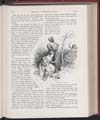
stnic.189007.001.004.jpg
None too soon was the warning given, for there, preparing to anchor in the peaceful little bay, was the British vessel. Already a boat¬load of sailors and soldiers was making for the landing.
Grasping poor, terrified old Betsy by the arm, Mistress Hungerford literally dragged her through the garden into a tangle of hazel-bushes, screened in front by the dense boxwood hedge. There the two frightened women hid, scarce daring to breathe, while the invaders landed and began the ascent across the lawn to the house,—a lawless, undisciplined crew, it seemed, who celebrated the landing by firing a volley of bullets straight at the house, crashing through the small window-panes, tearing to shreds the pretty dimity curtains, mutilating the pictures on the walls, and changing in a moment the beautiful little home into a scene of havoc and desolation.
It was only by physical force and dire threats that Mistress Prue kept the frightened negress from betraying their hiding-place, for the worst was yet to come. While tramping through the house, drinking, stealing, breaking furniture, feasting on the contents of the well-filled pantry, firing pistols at a stray chicken or a pet dog, coming sometimes so close to the women that they could have touched them through the hedge, the marauders were suddenly recalled by a bugle-call from the ship.
By preconcerted action, it seemed, each man brought from the barn an armful of straw. Some piled the straw inside the house, some outside—on the porch, by the doors and windows, and even on the roof, and then it was fired. The creeping lines of fire burst into flames, leaped around the gabled corners, crept along the dry oak wainscoting, danced and crackled on the well-seasoned weather-boarding, curled round the columns supporting the porch built in imitation of that at Mount Vernon, and, in less time than it takes to tell, reduced to ruins the happy home.
Indignation almost had the better of Mistress Prue's prudence; with difficulty she restrained herself from rushing out to denounce such shameful destruction—but alas! she knew of what avail such an outburst would be; then, there was her baby,—[illustration - Burying the silver.] she must protect herself for the sake of her child and her husband.
With a final volley the pirates (they were surely nothing more) boarded their ship and sailed away down the river.
Mistress Prue came out from her hiding-place, and through blinding tears surveyed the ruin a few short hours had wrought.
Deep and fierce were Mammy Betsy's denunciations of the marauders; and now that they were gone her courage rose, and she was equal to any emergency.
The stable-doors had been thrown open, and
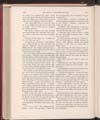
stnic.189007.001.005.jpgthe
horses had wandered far afield. Every man on the place had long ago fled in
terror, so there was nothing for it but to walk the weary miles across the
county to Colonel Carroll's.
"And 'deed, Miss Prue, we must jes' start, for it's a mighty long pull, and you ain't used to walkin'. Wish I could tote you," declared the faithful old soul.
"Oh, Betsy, I think I can stand anything after living through this! The sooner I get there, the sooner I shall have my baby to comfort me."
"Wish we had her right here; I nebber did like dat Diana, no how."
"Ah, Betsy, you are jealous!" said Mistress Prue, smiling through her tears, for Betsy had been her "Mammy" and the baby's, but now failing strength and eyesight had made it necessary that a younger woman should take actual charge of the active child.
Over the rough country road stumbled the tired women. Darkness came, and more than half their journey still lay before them. On, on they pushed, resting at more and more frequent intervals, until the welcome bark of the Carrolls' watch-dog announced their arrival. The animal knew Prue's soft voice, having come from her father's kennels, and was speedily licking her hand with every sign of welcome.
But nothing betokened any expectation, on the Carrolls' part, of receiving belated travelers. The house was strangely dark and silent. With a sinking heart, Mistress Hungerford pounded loudly the brass dragon-head knocker. No answer! The silence of the seven sleepers enveloped the house. Louder and louder the now almost despairing woman rapped. At length, with a bang, a second-story window was thrown open, and Colonel Carroll's ruddy face, framed in his silk knitted night-cap, peered forth like a full moon from a white cloud.
"What—what the deuce is the matter?" blustered the old gentleman, roused from pleasant dreams of successful law-suits and exciting fox-hunts to answer so unseasonable a call.
At this inhospitable greeting, poor little Prue, weary, homesick, and forlorn, broke down completely.
"It 's—it's—me!" she ungrammatically sobbed. "And I want my baby! I walked all the way from home, and it's burned!" she piteously added.
"Your baby's burned?" exclaimed the Colonel, trying to recognize the shadowy forms in the darkness. Suddenly, recognizing her voice, he cried out:
"Goodness! Prue Hungerford, is that you? What brings you here at this hour,—and what was that you said about your baby?"
"I want my baby, I want my baby!" wailed the now thoroughly bewildered Prue. "And you've got her!"
At this astounding declaration, Colonel Carroll retreated, lighted a candle, donned his clothes, called Mistress Carroll, and hurried downstairs to find Prue in a dead faint in Betsy's arms.
Tenderly raising the little woman, whom he loved as one of his own daughters, he assisted her to a sofa in the hall; and when Mistress Carroll appeared to administer restoratives, the old Colonel gathered from Betsy the story of their hardships.
"But what about the baby?" asked the Colonel.
"Dat Diana had her," answered Betsy. "She started in de carryall fur dis yere place. Ain't she come?"
"No," helplessly answered the Colonel's wife. "This is the first I've heard of it."
"Thunder and lightning!" stormed the testy old gentleman. "Here's a pretty mess!—the British in the county, every man defending his home, and I never knowing a thing about it! Where can that girl and baby be? Who was driving? Could she have lost her way?"
"Naw," disdainfully answered old Betsy. "Diana nebber lose her way. Jake done de driving, and he do anything Diana tell him. My opinion is, dat Diana hab joined the British!"
Thereupon Betsy fell to chafing her mistress's hand and wondering how they were to break the news to Mistress Prue when she came to.
The problem at once presented itself to the aroused household; some one had to tell Prue the baby was not there, for Mistress Carroll's cordials were taking effect, and Prue's blue eyes were soon gazing intelligently at the little group surrounding her.
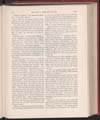
stnic.189007.001.006.jpg
"Where is Diana?" she demanded, sitting up. "Is my baby asleep?"
For a moment dead silence reigned; then, throwing her arm around Prue's waist and drawing her close, Mistress Carroll said gently:
"We think Diana must have lost her way or thought, perhaps, you meant her to go on to Mr. Fordyce's, because she has not been here; but Colonel Carroll will start out immediately, and of course he will find the baby by morning."
Poor little Prue! At this terrible intelligence, not the calmness, but the numbness of despair settled over her. Could fate have anything worse in store? Yes—John's death! That would come next. There was no use in crying out; there was no use in doing anything!
Alarmed at her silence and the stony rigidity of her face, Mistress Carroll deemed it best to talk of the baby. The men on the place were being divided off into search-parties, and Mistress Carroll bustled around feigning a cheerfulness she did not feel.
"Poor little dear!" she cried. "I fancy her peacefully sleeping, so unconscious of all the anxiety she is giving, and that stupid Diana complacently wondering why you don't come, never dreaming she has made a mistake. The Fordyces are probably as worried about you as we are about the baby. How did you happen to send her on ahead?—why didn't you come with her?" she asked, determined Prue should speak, even if violent hysterics would be the result, for anything would be better than that dreadful silence. Prue remembered it was her own avarice, as she sternly called it, that had caused the separation. For the love of a few paltry pieces of silver she had sacrificed her child. If she had followed John's directions,—had taken her baby and sought shelter in this hospitable home,—how happy she might have been! But now, for the love of gain she had willfully disobeyed him. She had forgotten her duty to John's child. What would be his feelings when he returned from fighting for his country to find his home destroyed, his child gone, and only she with her few contemptible treasures saved!
Mistress Carroll, being herself a Virginia house¬wife, thoroughly sympathized with Prue's desire to save her household gods, and did not take such an exaggerated view of her desertion of the baby, although she acknowledged Prue had been in fault, and that it would have been better to have kept the baby with her than have confided it to such untrustworthy hands.
"But, poor dear, you are nothing but a baby yourself; and you have shown yourself a brave woman in many respects this day. Cheer up, honey; we'll find the baby, and John will be prouder of you than ever!"
But Prue was not to be comforted; this inactivity was maddening. She must do something to help. She must go with the men. This, however, Colonel Carroll forbade. He had sent out several parties already; he himself would drive over to Colonel Fordyce's, and if they had heard nothing, he would then act on Betsy's suggestion. He would stop for Prue, and they would go back to the river and try to find out whether the British had taken any captives during the day.
While this plan was under discussion, the first search-party returned, much excited, bringing with them Jake, the driver, whom they had found hiding in the woods. Jake was evidently badly scared and loath to believe, until he saw "Miss" Prue herself, that he was in the hands of friends.
In his own peculiar fashion Jake gave his version of the day's adventures, which in plain English was as follows:
He had started on the right road for Colonel Carroll's, determined to obey to the letter young Miss's orders; but Diana had, from the very first, determined to drive down the river road. She was sure they could strike across the country lower down. It wasn't often she could drive in such a fine carriage, and she wanted to go by Mammy Lewis's to show herself. And, as Jake sheepishly if remorsefully said, "Diana was a mighty likely gal." She had evidently, by wiles and blandishments, won over Jake's susceptible heart until he was ready to do as she asked.
They had driven down the river road, and Jake had gone much farther than he had
intended when, to his horror, he suddenly saw in front of him three "redcoats."
The enemy quietly took possession of the horse and vehicle, remarking
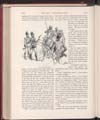
stnic.189007.001.007.jpg that it was much easier to ride than to walk,
and ordered him,—"at the pistol's p'int," averred Jake, turning gray at
the memory of his [illustration - The baby surrenders.] fright,—to drive them several miles farther on, to where they
expected to join their ship. The worst of it was that Diana, base, perfidious
Diana, smilingly made room for one of the soldiers beside her, and listened in
pleased wonder to his tales of the old country—where she could be a lady,
and never do any work, and dress as fine as any one. And Diana had declared she
had fine clothes now, a black silk and a gold chain, but that she could not go
to England, for here was young Missus's baby. "You can take the baby too; we
won't mind the child," insisted the engaging warrior, who saw in Diana a
candidate for the post of ship's cook, now vacant, and a good servant at home,
perhaps, later on. So it came about. Diana, refusing to give up the child, had
boarded the British ship; the soldiers had taken the horse, and were discussing
the advisability of letting Jake go or of putting him in irons, when Jake ended
that argument by taking to his heels.
"Well," exclaimed Colonel Carroll (cutting short Jake's rather voluble explanation of how he came across the search-party and of what they said to him and he to them; having had the floor so long, Jake felt himself to be something of a hero), "there is one point gained. We know who has the baby!"
Small comfort this, to half-frantic Prue, as she fancied her child a prisoner in the hands of the British, with no care but that of wicked, faithless Diana. "What can we do?" she piteously inquired. "Shall I ever see my baby again?"
"See her again? Well, I should say so!" roared the Colonel. "The spirit of '76 is not quite dead in this country; and I reckon that there's enough of us to keep a few blarsted Britishers from carrying off your uncle's grand-niece!"
"Goodness!" cried Prue, thrown into greater consternation by these words, "suppose Diana tells them!"
"Poof!" sniffed the Colonel, "I don't believe she knows enough!"
"No," said Mistress Prue, "I don't believe she does. Come, aren't you going to do something?" she impatiently cried,— "and remember, Colonel, you don't leave this place without me. I am going for my baby, to get her if I have to fight for her!" and Mistress Prue looked as if she could easily rout the entire British fleet. Colonel Carroll helplessly yielded, as all good men must when women assert themselves.
"I suppose we shall have to approach those fellows with a flag of truce," he disconsolately remarked. "I wish we had a battery to bring to bear on them!"
"But then you might hurt my baby!" interposed Mistress Prue, rapidly preparing for departure.
"Oh,—hm!—yes, yes, the baby,—of course," ejaculated the hasty
Colonel. "Ah, my dear,"
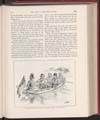
stnic.189007.001.008.jpg he blandly added, "are
you quite ready? Come, Jake, call the men and guide us to the rascals'
hiding-place."
This invitation Jake positively, if tremblingly, declined, until Colonel Carroll, waxing calmer and more dignified, as his wrath increased, informed him, that if he would not walk, he should ride strapped to a mule's back, and for the second time that day he should have the pleasure of being driven, not only at the "pistol's p'int," but with the cold steel on his forehead; whereupon Jake agreed to guide them without further persuasion.
So they started, four or five plantation hands, old Betsy, Mistress Prue, and the Colonel.
The sun was now well up, and a second perfect May day beamed upon the world, which in twenty-four hours had so changed for Mistress Prue. At this same hour, but one short day ago, she had been in her own house, her child in her arms, her husband by her side, a happy, prosperous, loved and loving woman. To-day, her home in ruins, her husband—she knew not where! —her child a prisoner, and she, foot-sore and so weary she could hardly hold up her head, starting on a forlorn quest to sue the enemy of her country to return her child: she, the first of her name to humble herself to British power!
Jake well knew the road, and before noon they came in sight of the British man-of-war, the same one whose crew had so devastated Mistress Prue's home.
There was some excitement on board; they were getting ready to sail. There was no time to be lost. Fastening a large white handkerchief to his cane, Colonel Carroll ran rapidly down the bank, followed by Prue, whose quick eye discerned, standing on the white deck, Diana, arrayed in her Mistress Prue's best black silk gown and gold chain, and holding in her arms the darling,—the baby, about to be forever carried from its mother's sight!
But, no! The flag is seen, the captain of the ship, although his crew is lawless,
is an officer of the British Navy and respects the laws [illustration - The captors respect the laws of civilized warfare. (See Next
Page.)]
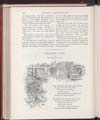
stnic.189007.001.009.jpg of civilized warfare. The truce is
answered, a boat is lowered, and soon the situation is explained to the English
lieutenant. He is deeply touched by Prue's pleading face and ill-concealed
impatience to receive her child.
"No," he answers, civilly enough; "we hardly regard it as a capture. The girl is engaged to cook for us while we are in these waters, but I will return the child immediately."
With which he pushed back to the ship, his every movement watched with trembling anxiety by Prue.
In the mean time, a small body of men in dark-green uniforms, who had been hiding behind the river-banks (and a knowledge of whose approach had perhaps accelerated the departure of the ship), might now be seen, marching down in open view, also headed by a white flag, making directly for the little party waiting on the shore.
Meanwhile, the latter were too intent upon watching the baby's transfer to the small boat to notice the new arrivals; but as the lieutenant hands the child to its mother, a strong arm is thrown around her,—she and baby are gathered into a sure, protective embrace, and John's hearty voice announces: "That 's all right, Lieutenant; the truce lasts one hour."
Colonel Carroll's jovial tones are now heard telling the lieutenant to inform his Captain that he has had the honor of holding as prisoner, for the last few hours, the grand-niece of General George Washington.

